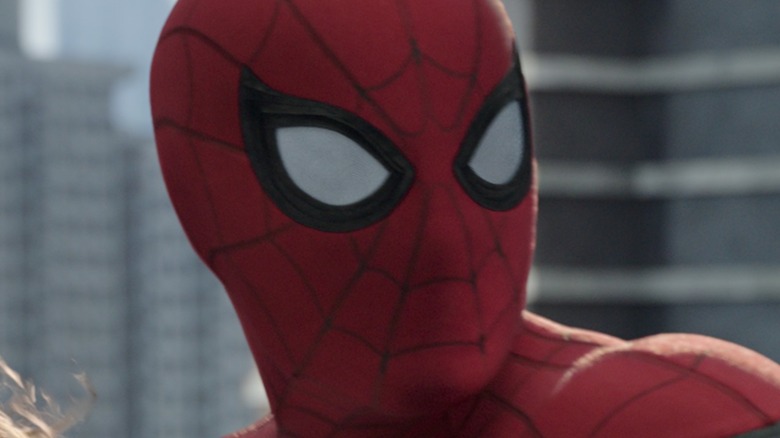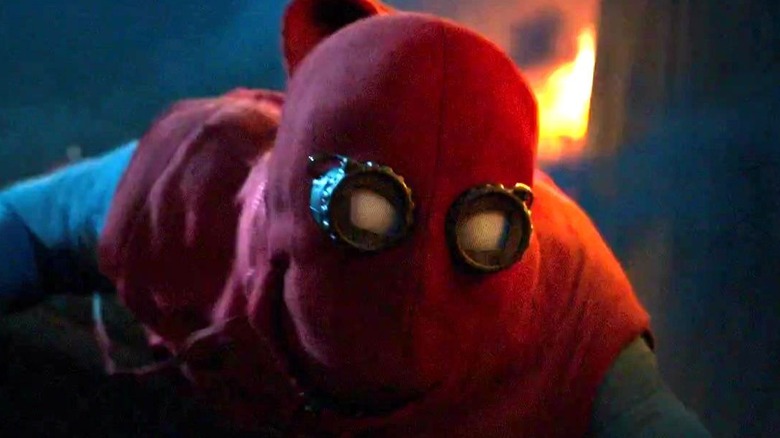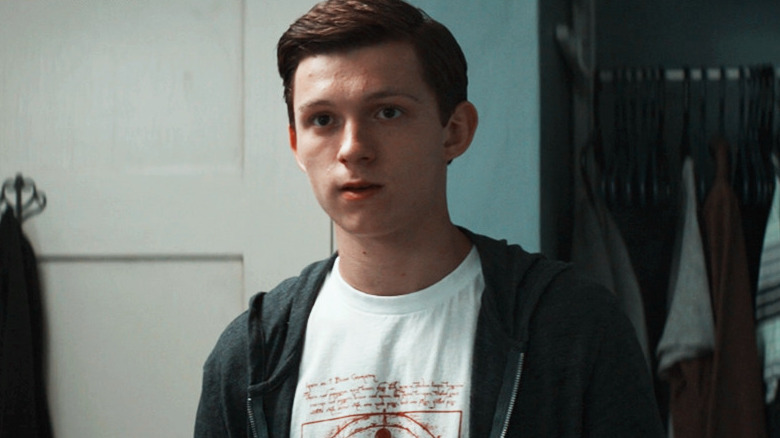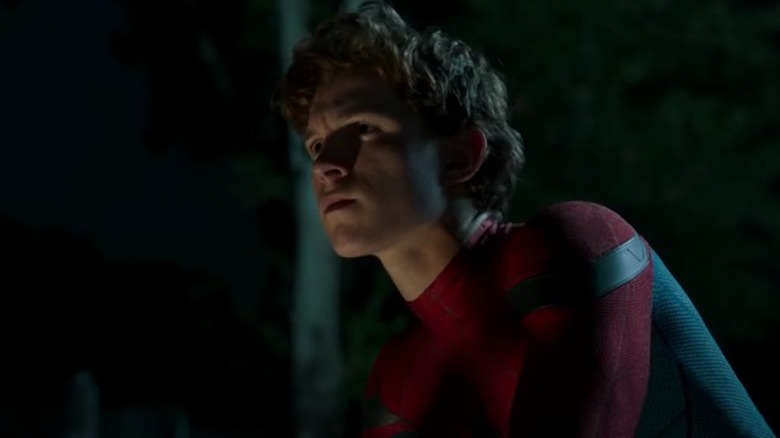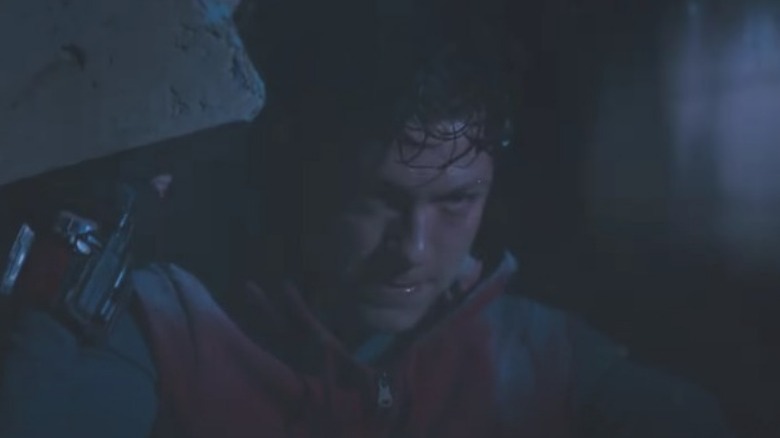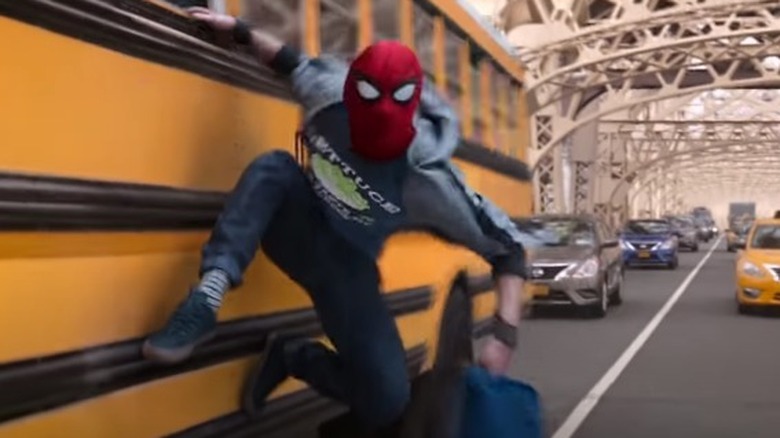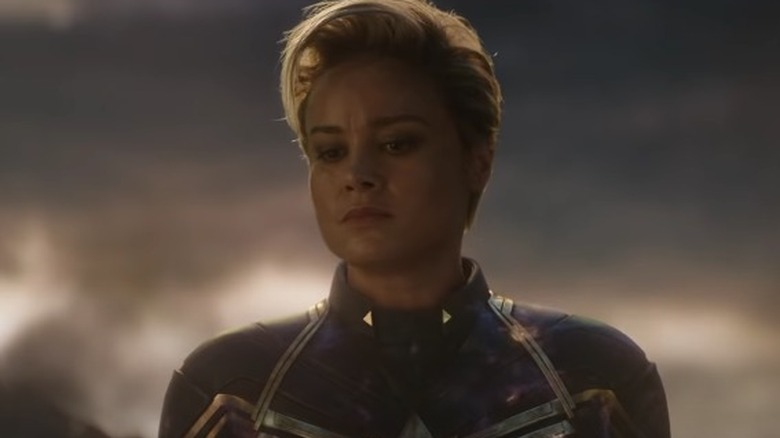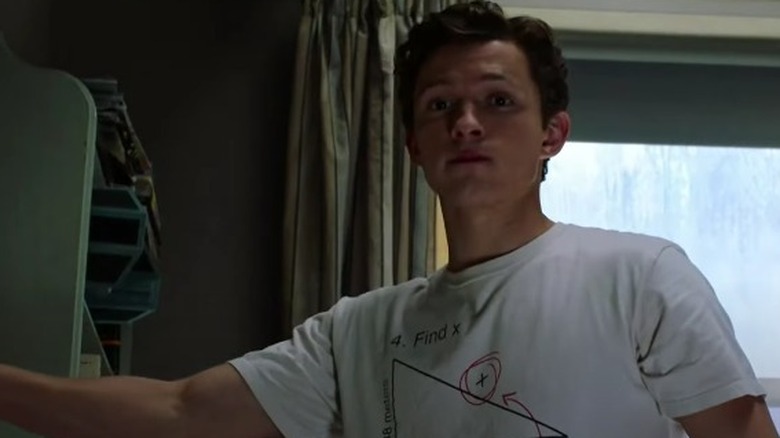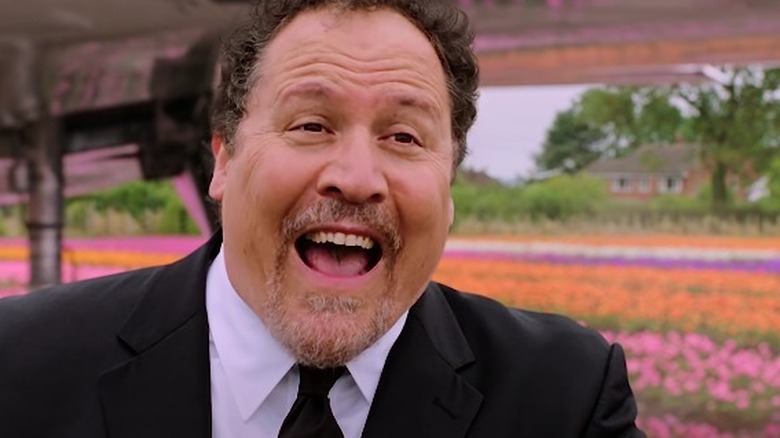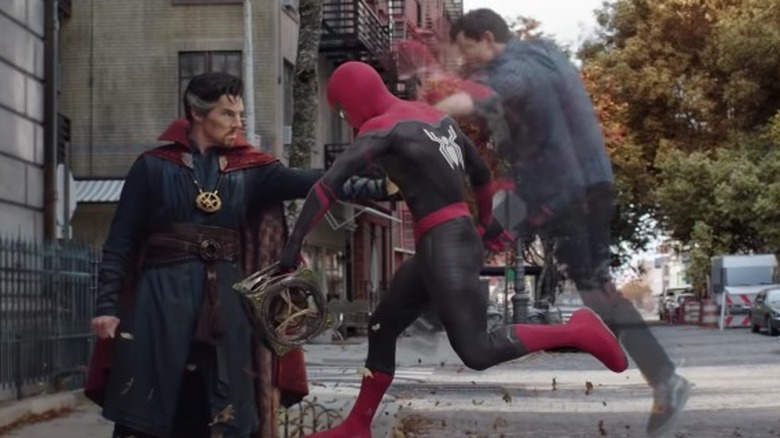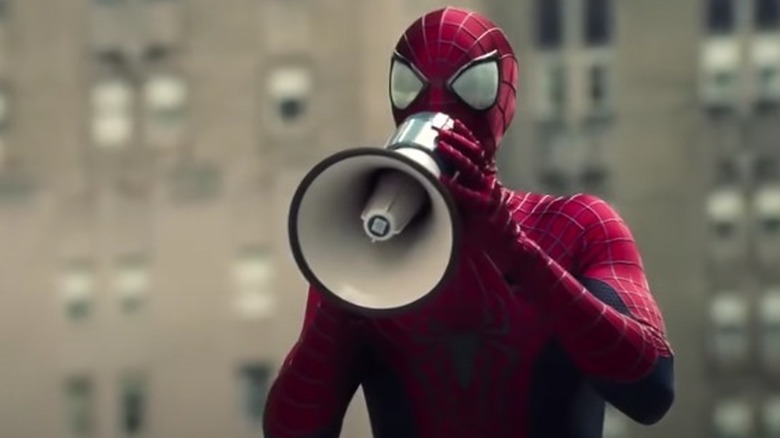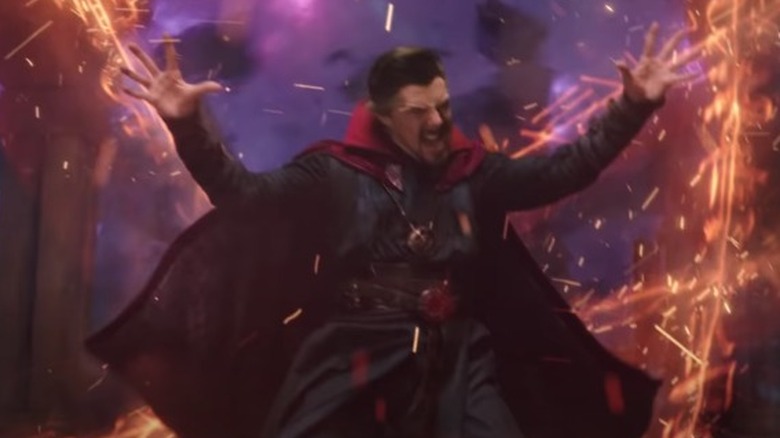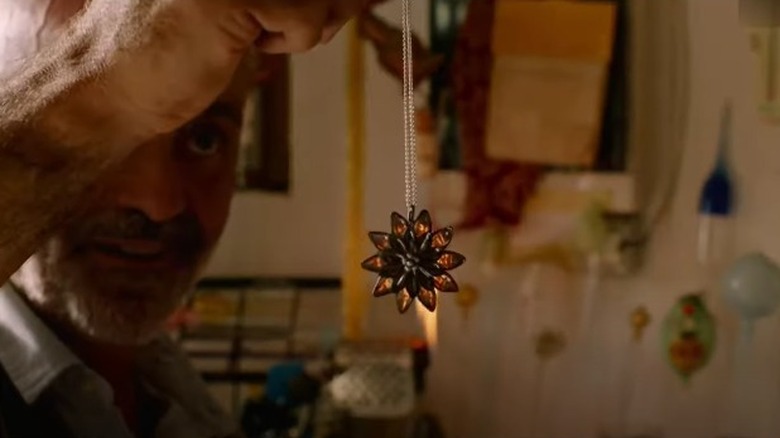The Best Decisions Spider-Man Made In The MCU
The character of Spider-Man just wants to help. He doesn't want to hurt anyone, either directly or indirectly. He's just a high school kid who was bitten by a spider that gave him these incredible abilities that he chooses to use for good. That being said, sometimes the decisions he makes have horrible consequences for himself and the people he loves. Still, he's trying to do good.
This is a character that works best when he is in over his head. Much of Spider-Man's charm is in watching how he thinks his way out of a problem. Sometimes these choices lead to actions with less than desirable results. Others, however, have led to everyone's favorite web-head saving the lives of his friends, New York City, even the entire universe.
That's why we're going to take some time here to look at decisions made by Spider-Man during the MCU that resulted in positive outcomes. Sure, many of them may have stemmed from poor options, or indirectly caused terrible things to happen, but the good certainly outweighs the bad here. These are the best decisions Spider-Man has made in the MCU.
Spoilers ahead for all the Spider-Man movies, especially "Spider-Man: No Way Home."
Becoming Spider-Man
Spider-Man's origin story is so well known that there's no reason to continue depicting it on the big screen. As stated in the introduction, he was a high school kid who was bitten by a radioactive spider that gave him amazing abilities. Comic book fans have read this origin many times over the decades since the character's debut, and film audiences experienced it in both Sam Raimi's 2002 "Spider-Man" and Marc Webb's reboot, "The Amazing Spider-Man," in 2012.
Therefore it made perfect sense for Marvel and Sony to forgo dramatizing these events when they finally brought the character in the Marvel Cinematic Universe for "Captain America: Civil War." By then, it had only been four years since we'd seen Andrew Garfield in the role. Everyone knew how Spidey got his powers — there was no need to rehash it all over again. Besides, the how of Peter Parker doesn't matter. Neither does the why really.
Aside from a few small references, we have not seen Uncle Ben in the MCU. The character who originally told Peter about great power's relationship with great responsibility isn't present in these films. So we don't have Ben Parker's tragic death to pin on Peter's decision to use his powers for good here. This version of Peter seems to just be a good kid with a big heart and spider abilities. Whatever his reasons for becoming Spider-Man, if he didn't decide to in the first place, the Marvel Cinematic Universe would look a whole lot different today.
Agreeing to help Tony Stark
In "Captain America: Civil War," Tony Stark recruits a kid from Queens to help him fight Captain America. That kid, of course, is Peter Parker. It turns out that there had been a video circulating of someone in red and blue pajamas stopping a speeding car from crashing into a bus. Tony had seen this footage and figured out who this masked hero was: Peter Parker.
From what we can tell, this conversation with Tony Stark is the first time Peter has had to confront his heroics. Until now, he's just been trying to keep his life as Spider-Man a complete secret. Suddenly, here's Tony Stark, Iron Man, standing in his bedroom asking him about it. Not only that, but the guy wants to take him to Germany. Peter has to make a decision: remain a YouTube myth or allow Spider-Man to step out into the light.
Since he's a good kid who just wants to help, he agrees to go with Tony. He didn't have to do that. He could have said no and kept everything low-key. That is probably the second biggest decision of this kid's life. Helping Tony Stark leads to him getting new suits, joining the Avengers, getting involved with S.H.I.E.L.D, and everything that happens in "Spider-Man: No Way Home."
Going to Liz's party
When Peter's best friend Ned finds out his pal's a superhero in "Spider-Man: Homecoming," he sees this as an opportunity. They're not exactly the coolest guys in school and Ned thinks they can leverage Peter's double life to help raise their cred. In gym class, Peter's crush Liz is talking about how much she likes Spider-Man, so Ned instantly announces that Peter knows him — against his friend's wishes, of course.
Since Peter knows Spider-Man, he gets an invite to Liz's party in the suburbs. Peter's not sure about going at first, but Ned convinces him. The plan is to show up, have Spider-Man swoop in and make it known that he's buddies with Peter Parker and Ned Leeds, and then disappear before anyone can ask questions. Things don't go as planned, though.
Instead, Peter sees an explosion in the distance that has him curious. He tracks down the source of the explosion and discovers a weapons deal going down. Not just any weapons, but sci-fi stuff that is obviously illegal. Earlier in the film, he stopped a crew of bank robbers who were using similar tech. This confirms for him that something big is happening and stopping it becomes a major priority. The decision to attend Liz's party allows the rest of the movie to happen.
Getting up
Peter Parker's friendship with Tony Stark resulted in a major upgrade to his suit. This new technology made Peter feel like he really was a superhero. This is exactly why Tony takes it away from him two-thirds of the way through "Spider-Man: Homecoming." Tony thinks that if Peter can't be a hero without the suit he doesn't deserve to wear it.
Going back to basics with those blue and red pajamas, Peter still decides to confront the Vulture. Peter's low-tech, barebones Spider-Man doesn't last long against Vulture alien-tech and he is quickly covered by a collapsed cement ceiling. The intense weight would crush anyone not bitten by a radioactive spider, and without Tony's suit, it almost crushes him.
However, because Peter Parker is a hero, he refuses to be held down. Hyping himself up, Peter manages to rise from the rubble and take down the Vulture for good. If he didn't decide to hero-up and keep going, there would have been a lot of very bad people with very powerful weaponry running amok all over the MCU.
Getting off the bus
At the start of "Avengers: Infinity War," the Earth is threatened by the arrival of Thanos' servants. This danger is sensed by Peter Parker as he returns to Queens on a school bus after a field trip, thanks to his spider-sense (or "Peter-Tingle," if you're Aunt May). He looks out the window and sees a massive, ring-like ship hovering over Manhattan. Clearly this is a threat way beyond his capabilities as a friendly neighborhood Spider-Man, but he decides to try and help anyway.
There's never any doubt that Peter would try and help, because that's who he is, but this is one of those major decisions that yield both good and bad results. Despite the best efforts of the Avengers, Thanos still wins. He snaps his fingers and erases half of all life in the universe. Peter plays a critical role in making that happen, even if he's just trying to help like everyone else. Would Thanos still have won if he wasn't there? Probably, but we can't say for sure.
Still, the heroes don't make it easy for Thanos, and that's thanks to Peter as well. Plus his involvement here leads to his introduction to Doctor Strange, a relationship which would blossom over the course of two more movies.
Giving the gauntlet to Captain Marvel
Five years after Thanos wiped out half of all life in the universe, the Avengers bring everyone back in "Avengers: Endgame." Now all they have to do is destroy Thanos and destroy the Infinity Gauntlet before he has a chance to do it again. During the epic battle between the heroes of the MCU and Thanos' army, Spider-Man gets his webs on the gauntlet, immediately making himself a target.
With the help of Captain America, Pepper Potts, and Valkyrie, he manages to get the gauntlet partially across the battlefield. The chaos of war is too much, though, and he finds himself on the ground, isolated. That's when Captain Marvel swoops in to help. Her presence draws the fire of Thanos' cannons, giving everyone else a chance to breathe. She destroys Thanos' ship and lands in front of Peter Parker. He introduces himsel, to which she responds, "Hey, Peter Parker. You got somethin' for me?"
Again, this isn't much of a choice, given what he just saw, but Peter does decide to let someone else be the hero here. He hands her the gauntlet, which she manages to get in the vicinity of Tony Stark. If Peter hadn't done that, Stark may not have been able to snap Thanos away.
Taking a break
By the time "Spider-Man: Far From Home" rolls around, Peter's feeling a little burned out. For one thing, he was erased from existence. When he came back, it was in the middle of a war zone and five years had passed. Then, to top everything off, his mentor up and sacrificed himself to save the universe. Yeah, he's been through a lot.
When the chance arrives to take some time off and visit Europe with his classmates, Peter uses the opportunity to take a vacation. Peter just wants to be Peter for a bit; he can be Spider-Man again when he gets back. Of course, because he is always Spider-Man, nothing is ever easy and his European vacation gets hijacked by Nick Fury.
In no time at all, he is recruited into a fight against entities known as elementals with a mysterious man named Quentin Beck claiming to be from another universe. Peter makes some poor decisions here, like giving Beck Tony's glasses and access to all of his technology, but the decision to go to Europe was a good one as it meant he was where he needed to be to help.
Calling Happy
Peter learns just how bad his decision to give Tony's glasses to Beck was when the guy tries to kill him. Since he's Mysterio, he can't just show up and shoot Peter in the head, he needs to make a show out of it. Beck uses the Mysterio technology to create a false reality where Peter can't trust his own eyes. Beck essentially mind-tortures Peter, toying with his guilt over Tony Stark's death and forcing him to question if he even deserves to be called a hero.
During their confrontation, Peter is hit by a train that knocks him out. He wakes up in a jail cell in the Netherlands. With no one around who can help, Peter makes the decision to call one person he knows he can trust — Happy Hogan. Although their relationship isn't the best, Happy wants what's best for Peter, so he shows up right away. While on one of Tony's jets, they talk about their lost friend and whether or not Peter has what it takes to continue Iron Man's legacy.
This conversation gives Peter the motivation he needs to summon the last of his remaining energy and make it to England to save his friends. If he hadn't called Happy, Peter probably still would have tried to get there, but he may not have been as successful and his confidence may have never recovered.
Trapping Doctor Strange
As impossible as it may seem, Peter's life becomes even more complicated after J. Jonah Jameson releases the video of Quentin Beck blaming Spider-Man for his death and revealing his true identity to be Peter Parker at the end of "Far From Home." Seriously, this guy cannot catch a break. If this knowledge only affected him, Peter could probably handle it, but in "No Way Home," it's also making life for his friends difficult. Seeing no other choice, Peter visits Doctor Strange for help.
Strange agrees to help Peter by casting a spell that will cause the world to forget that Peter Parker is Spider-Man. However, Peter's desire to adjust the spell so that certain people in his life still remember the truth results in the spell malfunctioning. Suddenly, villains from alternate realities start showing up, ready to destroy Peter Parker. Strange says that they need to go back to their respective realities to prevent any more damage to the multiverse.
Peter can't let that happen because returning to their realities means certain death for each of them. Again, just wanting to help, Peter defies Doctor Strange and the two battle things out in the mirror dimension. Peter manages to use math to trap Doctor Strange there so he has time to come up with another plan. If he hadn't done this, then he wouldn't have found a cure for the villains, saving all of their lives, even if it meant losing his Aunt May.
Spider-Man team-up
By the time Andrew Garfield and Tobey Maguire show up in "Spider-Man: No Way Home," Peter has been tested to his breaking point. He tried his best to help and May was killed in the process. He is ready to give up. He even says so to the alternate Peters. They try to tell him that they know what he's going through, but he doesn't want to hear it. He's made up his mind and he's sending everyone back where they came from.
Still, he hears them out. He listens to what happened to them. He identifies with the rage they felt over the loss of Uncle Ben and Gwen Stacy. He sees that he is not alone in the pain he's feeling. They want to make sure he doesn't end up like them, lost and angry. So he agrees to work with them, even if he isn't totally sure he's going to be able to stop himself from killing Norman Osborn.
This decision saves Peter's life. During the final moments of their battle on the Statue of Liberty, Peter is hitting Osborn with all he's got. He's about to decapitate the guy with his own glider but is stopped by his alternate selves. If he didn't agree to trust them, he may have pushed himself too far and never recovered.
Adjusting the spell
When the villains' cures are handed out and the fight is over in "No Way Home," there's only one more thing to do. Doctor Strange is trying to keep the multiverse from tearing reality apart as an infinite number of people who know Peter's identity are being pulled into their world. In this time of incalculable desperation, Peter asks Strange to wipe out any knowledge of Peter Parker from the universe. Strange tells him it will be like he never existed, but Peter knows there is no other choice.
As heartbreaking as it is to know that Ned, MJ, Happy, and the Avengers won't remember Peter, it is the right decision. Not only does this mean that the multiverse is saved, but it also means his friends' lives can go back to normal, which is what he wanted all along. For audiences, though, this also means we will probably be getting a solo Spider-Man without all the gadgets and resources. In the films to come, the MCU version of Spider-Man might start to look a bit more like the one that has existed in the comics for decades.
The black dahlia
Before Peter can tell MJ how he feels about her, he wants to get her a gift that he knows she'll love. From what we've seen, this MJ has a bit of a macabre side. She is well-versed in conspiracy theories and enjoys true crime. Therefore, Peter thinks that the best thing to do would be to get her a glass black dahlia necklace (inspired by the infamous murder) while in Venice. He would then give it to her at the top of the Eiffel Tower. Naturally, this plan goes out the window, but he does manage to get her the necklace, even if it's broken.
After the madness has died down and the world returns to normal, Peter visits MJ who is working at a doughnut shop. His buddy Ned is there also and both Ned and MJ just found out they were accepted to MIT. Sadly, neither of them seems to have any memory of who this guy is. That may not be the case forever, though, as MJ is wearing the necklace Peter gave her.
While all the details of Doctor Strange's spell remain to be seen, it is entirely possible that this necklace will somehow serve as a trigger to remind MJ who Peter is ... and end up reuniting them once again.
